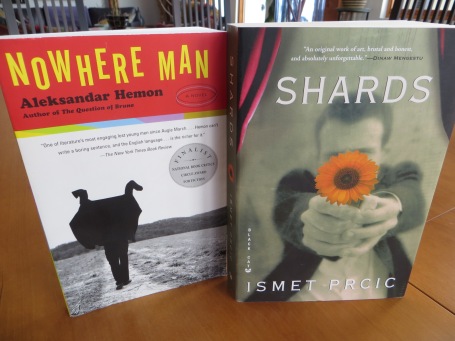The news from Tuzla and Sarajevo, Bosnia is not good. People want work. They want an efficient government. They are angry that state-owned businesses that were privatized have declared bankruptcy after having enriched a few exploitative speculators. They are demonstrating against a system (conceived as a stop-gap during the Dayton Peace Accord talks) that has failed them.
Demonstration is one response to a breakdown like this. Demonstrations against oppressive and nationalistic regimes were a common response during the civil wars 20 years earlier. I witnessed one of these in Belgrade in 1998, visiting my friend Zarko.
Emigration is another response to war and economic disaster. Zarko’s brother Miloje left his job (unpaid for months) in the national film archive to emigrate to Canada. Zarko wrote a book with the title Emigracija.
Ismet Prcic (ISS-met PER-sick) emigrated from Tuzla in 1996 at the age of 19. Aleksandar Hemon emigrated from Sarajevo in 1992 at the age of 28. Both men now write and publish in English.

In their novels Nowhere Man and Shards, Hemon and Prcic feature emigrants whose new lives as immigrants in the United States split them. They have been, to quote a character in Prcic’s novel, “fucked into shards.”
Nowhere. Shards. Both narratives tremble in their instability, shift from one narrator to another—although the other narrator may in fact be the one narrator. Both stories leap from continent to continent (Chicago, the Ukraine, Sarajevo, London, Tuzla, Los Angeles). The stories leap from Greenpeace to war to peace that is war—BOOM! Characters in both books speak “Bosnian,” which is, of course, also “Serbian” and “Croatian,” with only culinary differences. Bosnian characters, cultural Muslims of Tito’s Yugoslav united brotherhood, encounter Serbs in their new country who have become, through the war, Serbian nationalists, but who, because of the common language, are unable to detect the Bosnian interlopers and who, in the end, are as deeply needy of a comforting arm around the shoulders as are the Bosnian immigrants.
Serbs are not the enemy in these novels. War is the enemy. Separation and loss are enemies.
Viciously split personalities result from terror and flight and accommodation. The complex and brilliant narrative strategies of the two novels place a reader squarely in the mix of those shards.
And in the end, a reader knows that all personality is made up of shards. All stories are constructed of shards. Only liars and frauds pretend otherwise. Only the ignorant suppose they are whole.
All readers are emigrants.

i agree.
LikeLike
you know more about this than i do. thanks for the comment.
LikeLike
thanks for the comments and insight
LikeLike
you asked the other day about the very things i was reading about. nice coincidence.
LikeLike